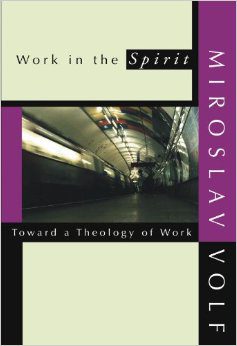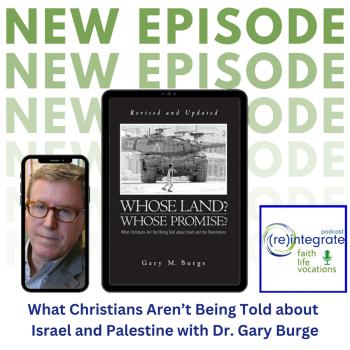 A major problem with our modern conception of vocation is that we preceive our “spiritual” life as disconnected from the actual work that we do as participation in the mission of God. In his excellent book that explores theology of vocation, Miroslav Volf contends,
A major problem with our modern conception of vocation is that we preceive our “spiritual” life as disconnected from the actual work that we do as participation in the mission of God. In his excellent book that explores theology of vocation, Miroslav Volf contends,
“The sphere of the new creation cannot be tied to the ‘inner man.’ Because the whole creation is the Spirit’s sphere of operation, the Spirit is not only the Spirit of religious experience but also the Spirit of worldly engagement.” (Volf, Work in the Spirit, p. 110)
The role of God’s Spirit cannot be ignored in the concept of calling.
 Volf’s theology of vocation centers on the Holy Spirit’s role in the present new creation begun with Christ. For if there is a calling, then there is a caller. Volf believes that our understanding of “Spiritual Gifts” needs to be broadened.
Volf’s theology of vocation centers on the Holy Spirit’s role in the present new creation begun with Christ. For if there is a calling, then there is a caller. Volf believes that our understanding of “Spiritual Gifts” needs to be broadened.
“One should not define charisma so narrowly as to include in the term only ecclesiastical activities.” (p. 111)
Churches often give “Spiritual Gifts Tests” to their congregants with the intention of helping people find their role in the local church. For instance, LifeWay Christian Resources has a downloadable “Spiritual Gifts Survey” authored by Gene Wilkes. In its introduction, he writes,
“Ken Hemphill defines a spiritual gift as ‘an individual manifestation of grace from the Father that enables you to serve Him and thus play a vital role in His plan for the redemption of the world.’ Peter Wagner defines a spiritual gift as “a special attribute given by the Holy Spirit to every member of the Body of Christ according to God’s grace for use within the context of the Body.’ I like to use this definition: A spiritual gift is an expression of the Holy Spirit in the life of believers which empowers them to serve the body of Christ, the church.”
While Hemphil’s definition is broad (he says that spiritual gifts are to “play a vital role in His plan for the redemption of the world”) Wagner’s and Wilkes’s definitions are narrowed to the belief that the gifts can only be used within the context of the church.
The gifts of the Spirit are not just “extraordinary.”
However, Volf points out that biblically, the charisms are not limited to that which is done in the local congregation. After all, he argues, the gift of an evangelist presupposes action outside the Christian fellowship, and contributing to the needs of the destitute does not cease to be a charisma when it is exercised to non-Christians.
We have grown accustomed to calling human skills, abilities, and knowledge (like crafts, poetry, medicine, etc.) “natural,” while we call certain more sensational gifts “supernatural.” No dichotomy like this is found in the Bible, not in the original Created Order, nor in the New Creation in Christ.
Volf says that in spite of the fact that in many churches charismatic gifts are still widely believed to be “extraordinary,” that is not what the New Testrament actually teaches.
“One of the main points of the Pauline theology of charisms is the overcoming of such a restrictive concentration on the miraculous and extraordinary. For this reason it is of great importance to keep the term charisma as a generic term for both the spectacular and the ordinary.” (p. 112)
Image by Isaí Moreno. Used with permission. Sourced via Flickr.
Stay in touch! Like (re)integrate on Facebook:













